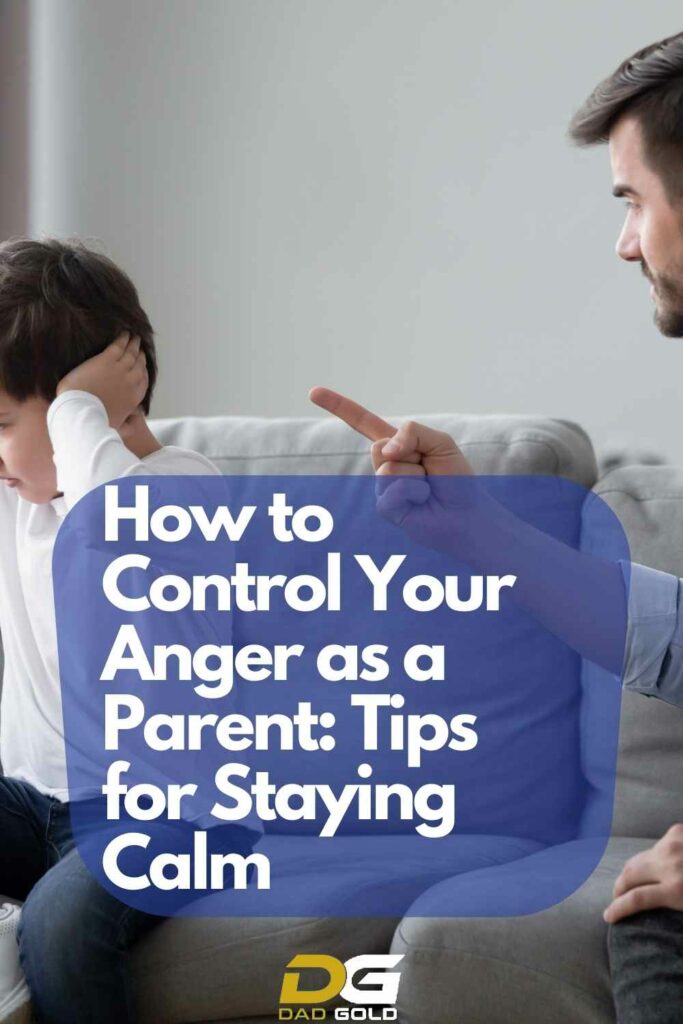Anger is a natural emotion, but it can be difficult to control when you’re a parent. When things get tough, it’s easy to fly off the handle and say or do things that you’ll regret later.
This blog post will discuss some tips for staying calm when anger takes over.
These tips will help you maintain your composure during stressful situations and help keep your anger in check.

The importance of staying calm as a parent
It is important to stay calm when things get tough as a parent. This way, you will be able to handle the situation better, and your child will learn how to deal with anger healthily.
The more you show anger as a parent; the more your child will copy you. What does that lead to? More anger to deal with! It’s a vicious cycle.
Understand your anger triggers and why you get angry
Anger can be a normal and healthy emotion, but it can become a problem when it’s too intense or lasts too long. Common anger triggers include feeling frustrated, helpless, or powerless; being ignored or disrespected; and feeling trapped or helpless.
If you’re a parent, it’s essential to understand your anger triggers and how to deal with them healthily.
It might be when you are faced with a crying baby (it’s common, get used to it).
-

Bold Male Pride – Baseball Trucker Cap Celebrating Masculinity
£18.00 Select options This product has multiple variants. The options may be chosen on the product page -

Dad Bod Appreciation Gift Mug
£14.00 Add to cart -

Dad Bod, Bad Jokes Structured Baseball Cap
£22.00 Select options This product has multiple variants. The options may be chosen on the product page
After all, you’re the role model for your children, and you want to set a good example.
Here are a few tips for controlling your anger as a parent.

Don’t take things too personally – remember that it’s not about you
Anger can often be a strong emotion, and it’s easy to take things personally when our kids are acting out. However, it’s important to remember that it’s not always about us.
Sometimes, our children just act out because they feel overwhelmed or frustrated. If we can stay calm and not take things too personally, we’ll be better equipped to handle the situation.
Try to see things from your child’s perspective.
It can be helpful to try and see things from our child’s perspective. This doesn’t mean condoning their bad behavior, but it can help us understand where they’re coming from.
If we can see things from their perspective, we may be able to find a way to help them that doesn’t involve anger or yelling.
Take a few deep breaths and count to 10 when you feel angry.
When you feel anger start to build up, it’s important to take a deep breath and count to 10. This will help you calm down and avoid saying or doing something you’ll regret.
If you’re still feeling angry after counting to ten, try repeating the process until you feel more in control.
It’s also important to avoid reacting in anger when your child does something wrong. This will only worsen the situation and cause your child to become scared or resentful.
Instead, try to talk to your child calmly and explain why their behavior is unacceptable.
Remove yourself from the situation if possible until you’ve calmed down
If you find yourself getting angry, it’s important to remove yourself from the situation until you’ve calmed down. This may mean going to another room, going for a walk, or even just taking some deep breaths.
Once you’ve calmed down, you can return to the situation and deal with it more constructively.
Talk to your partner or another adult about your feelings and strategies for dealing with anger.

When you feel anger start to build up, it can be constructive to talk to your partner or another adult about what’s going on. This can help you get some perspective and figure out a plan for dealing with the anger. It can also be helpful to have someone to talk to who can offer support and understanding.
Avoid yelling or using physical punishment – these only make the situation worse.
When you’re feeling anger, it’s essential to avoid yelling or using physical punishment. These only make the situation worse and damage your relationship with your child.
Instead, try to stay calm and constructive.
Seek professional help if you’re struggling to manage your anger effectively.
Anger can be a complex emotion to manage, especially regarding parenting. If you’re struggling to keep your anger in check, it might be time to seek help from a healthcare professional. Anger management counseling can provide you with the tools and techniques you need to better deal with your anger.
If you’re unsure where to start, your doctor or a mental health professional can help you find the right resources.
Don’t hesitate to seek help if you’re struggling to control your anger. It’s nothing to be ashamed of, and getting professional help can make a difference.
The benefits of maintaining a calm demeanor when parenting
One of the benefits of maintaining a calm demeanor is that it sets an excellent example for your children.
When they see you reacting calmly to difficult situations, it helps them learn how to do the same. Additionally, remaining calm can help diffuse difficult situations before they escalate.
Of course, anger is a normal and healthy emotion. It’s important to model healthy ways of expressing anger for your children.
Exercise or do something calming like yoga or meditation

When anger takes over, it’s hard to stay calm and think straight. That’s why it can be helpful to have some strategies to help you manage your anger.
Exercise and yoga are great ways to help you stay calm and relaxed.
Meditation can also be a helpful tool for managing anger. By taking some time each day to focus on your breath and clearing your mind, you can help to center yourself and stay calm in challenging situations.
If you’re a parent, anger is likely to come up from time to time. It’s important to model healthy anger management for your children. When you’re able to stay calm and constructive in the face of anger, you can help your kids learn to do the same.
Conclusion
The next time you feel the anger building, try one of these techniques to help you stay calm.
If you find yourself constantly yelling and lashing out at your kids, it’s time to take a step back and reevaluate your parenting style.
It might take a little practice, but eventually, you’ll find that your anger and frustration are more manageable and don’t get the best of you.
Remember, it’s okay to be upset, but don’t let your anger control you or damage your relationships with your children.
Follow the strategies on this page to help keep yourself in check.
Good luck!




